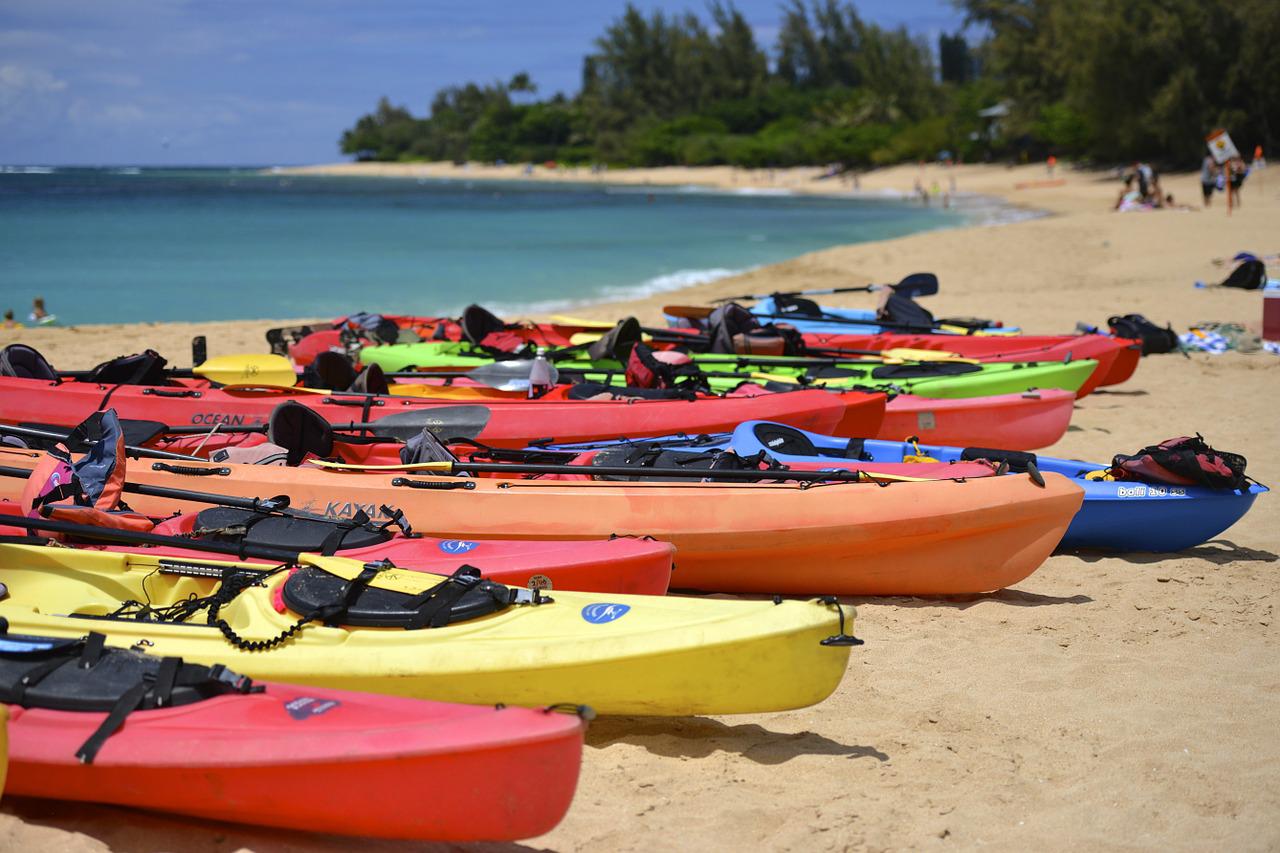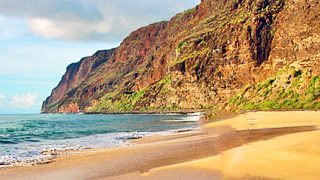Last week, the Kauai County Council moved forward with a bill to require those visitors and residents rescued to take responsibility and pay for the extreme costs of both ocean and land rescues on the Garden Island.
Bill 2910 proposes individuals pay for all search and rescue over $1,000.
The discussion centered around Bill 2910, which proposes empowering the county attorney to assess individuals for potential payment of search and rescue expenses exceeding $1,000.
Bill 2910, as drafted, is attached below. The council is expected to vote on the bill on December 6 .
“If they are disregarding the warning signs and putting our responders at risk, no, they should pay. People must start taking responsibility for their actions and the risk they pose to our first responders. That is my biggest concern. Disregard for that has no excuse.”
Mel Rapoza, Kauai Council Chair
Council member Felicia Cowden was the sole member to vote no on the proposed bill. She said, “These adrenaline-charged youths that have reckless courage and difficulty recognizing boundaries, and limits, a lot of them come from families that cannot pay for it.”
When we read the bill, however, it says: “Rescue Operation means the effort to free or remove an individual or individuals placed in a situation or distress….” It seems to include any rescue and not just from trespassing or hiking on closed trails.
Some of the key takeaways from the attached bill include these expenses:
- Materials and supplies, and compensation for employees’ time and efforts devoted specifically for the purpose of the rescue operation.
- Rescue equipment usage, including helicopters, boats etc.
- Other special services specifically required for the rescue operation.
- Medical expenses incurred as a result of the rescue operation.
- Legal expenses incurred as a result of rescue operations, including efforts to recover expenses pursuant to this bill.
Regarding trespassing and intentional disregard for safety:
“Any and all persons who cause or contribute to the placement of an individual or individuals in a situation of distress or peril, via any act of omission which constitutes an intentional disregard for the individual or individuals’ safety, and which results in a rescue operation shall be liable to the County for all recoverable expenses resulting from the rescue operation… Intentional disregard for safety include, but are not limited to, intentionally disregarding a warning or notice.” – Bill 2910.
Issues are heightened when trespassing occurs, as is made clear in this bill. The debate arises over who should bear financial responsibility for rescues of individuals venturing beyond warning signs or breaching locked gates and sustaining injuries. Here in Hawaii, there is growing consensus that the onus should fall on the injured persons.
The Hawaii State Legislature, too, has been grappling with this matter for several years, and Hawaii has noted that six other states already implementing charges for search and rescue resulting from negligence. Conversely, some states, like Colorado and Utah, provide rescue insurance at a nominal cost instead of reimbursement.
You’ll remember not long ago at perilous Queen’s Bath on Kauai, a Florida visitor was airlifted by Kauai firefighters after a fall-related injury. Despite the site being closed to all visitors, the incident unfolded.
Then at Wailua Falls, the rescue of a 67-year-old visitor from California who slipped and fell 25′ off the trail made the news. After receiving on-site treatment for multiple head injuries, he was hospitalized. Wailua Falls, one of Kauai’s most spectacular waterfalls with its 173′ drop, is accessible from the top, but venturing further involves trespassing and poses serious risks.
There have been countless Kauai visitor emergency helicopter evacuations.
These raise questions about who should bear the costs. In another incident, a 32-year-old Californian was airlifted from the Kalalau Trail at Haena State Park due to a knee injury. Despite being offered transportation to the hospital, the individual declined further assistance, leaving Kauai with expenses for air transport, ambulance services, and personnel. Who exactly should cover these costs?
And not long ago on the same trail, three hikers faced challenging winter weather and trail conditions, requiring Air 1 first responder helicopter assistance. After being transported to Hanakapiai Beach, the hikers continued their journey. Again, the question arises: who should be responsible for their associated expenses?
Then, a California hiker with unspecified injuries received a helicopter evacuation from the Kalalau Trail to Princeville Airport, subsequently requiring transportation to Lihue for emergency room treatment. Just before that, a 53-year-old female Utah visitor sustained injuries after jumping from a rope in Kapaa, necessitating air evacuation. Once more, the issue emerges – who should foot the bill for rescues?
State legislature entertains similar anti-trespassing proposal.
Earlier this year, the Hawaii legislature, anxious to move forward with an anti-trespassing and reimbursement, began but thus far did not complete that job with SB 786.
We’ll be hearing much more about resues and intentional disregard for safety in this debate. What’s your take on this?
2023-11-15-ph-bn-2910Get Breaking Hawaii Travel News







I completely agree with the people requiring rescue—especially from location’s marked not to enter and/or private property—should be responsible. It’s very expensive and often dangerous for rescuers. My husband & I have hiked in Kauai. Wanting to see more is understandable but the signs are there for a reason. You break the rules, you pay the price.
In theory this seems like a good idea, but in practice, I doubt it will work. How do you determine what is reckless? For example, what if an individual crashes his car and slides down an embankment, thus needing rescue. Does a situation like that fall under the rules of this bill? Who, exactly, determines if a person was negligent?
Not talking about that kind of accident. Talking about people hiking where they are not supposed to be, or trespassing on private property just so they can access a specific location. Ignoring warning signs, and climbing over guard rails to take a photo. Then, when they fall, slip, get lost, etc, they want to be rescued. There is absolutely no excuse for that behavior. Just like this time of the year, with the high surf. They refuse to listen to the warnings, and when something happens, right away they want to be rescued. Yes, they should have to responsibility for their actions!! Period
This is Councilmember Felicia Cowden. I didn’t vote No on the bill.
Hi Felicia.
Is there an error on the County Bill itself? If you read it (embedded below article content), it shows you as voting no.
Aloha.
Yep I Agree: = “If they are disregarding the warning signs and putting our responders at risk, no, they should pay. People must start taking responsibility for their actions and the risk they pose to our first responders. That is my biggest concern. Disregard for that has no excuse“If they are disregarding the warning signs and putting our responders at risk, no, they should pay. People must start taking responsibility for their actions and the risk they pose to our first responders. That is my biggest concern. Disregard for that has no excuse.”
100% agreed!! If these people cannot follow warnings and posted signs, then they definitely need to pay their rescue bill! And I know from experience, you can’t tell them anything. They think they know everything. No manners, no respect. Super entitled. Tired of this happening over and over. They should not come here if they don’t want to act better than that! The islands are being overrun with these selfish people.
I’m gals there doing this people need to be held accountable for there actions. It should not be placed on the tax payers.
Those funds could be used for other things That hawaii and Hawaiians need… not footing the bill for people’s neglect or peoples irresponsiblety….
Mahalo…..
My hope is that they follow this up by requiring people take responsibility for all their decisions instead of making the rest of us pay for them!
Oh Tom. I agree with you 200 percent. I am exhausted to always hearing the “Let’s get rid of this, because the general public does not have the intelligence or common sense to make decisions that will affect all of us” I am tired of paying for everyone else’s mistakes. Learn to take responsibility!
If this becomes law, injuries will be untreated, with some injuries lasting a lifetime. More will die, afraid to call for help when it’s really needed.
This should always be a public service; just as the fire department puts out fires, rescue should rescue without a charge.
A charge sounds good until you think of the long-term consequences.
Just don’t let the Council give tourists another reason to look elsewhere for their vacations. At some point, the military will find a reason to close one of its bases in Hawaii, and tourism will be even more important than it already is.
Is ambulance service free in Hawaii?
There is also a somewhat unfeeling phrase that also applies – stupidity should be painful.
We also as a general rule are not talking about the indigent here – we’re talking about people who have already paid (or put on credit) a minimum amount in the thousands of dollars just to get where they are.
The first few to get charged will hopefully serve as a lesson that will be learned by others in the future.
We don’t need more of these kinds of people on the island. They can’t even follow simple rules! SAR teams are putting their lives at risk for those people who have blatant disregard for rules, signs, etc.
Yes I’m in support of bill 2910, Financial responsibility should fall on those who make irresponsible decisions that put our first responders in avoidable situations. The insurance option sounds like a good idea as well.
Seems fair to me, if visitors and locals will be charged for these types of services as the article states.
As someone else mentioned, it seems as though it would make sense to offer rescue insurance to people that are getting permits to hike the Kalalau trail, for example.
It should be treated like EMS and it should always be billed to the person being treated. There should be no bearing on what they do after the rescue. It was rescue services period.
Certainly having every visitor pay a fee upon arrival would generate more income, it might not meet a constitutional challenge. As a frequent visitor, I do not like the concept. With 30+ visits we have never utilized emergency services. I would certainly not object to paying for services received.
There needs to be mechanisms to cut down on false alarms. For example, if someone calls 911 but personnel arrive and find out it’s just a nuisance call likely related to trespassing and a rescue was not merited, then the caller should bear the cost of the response. Reporting trespassers is one thing, but calling 911 to stick it to them is a waste of resources as well. Happens on O’ahu.
They’d be more better off just creating a public charge bond fund and fee for all tourists where the fee is pooled together specifically to offset public charges. Individual case assessments aside, there is no need for a minimum public charge cost impact. The Dept. of State does it for foreigners seeking entry and naturalization, the State should do it as well because most visitors are foreigners and unaccustomed to the Hawaiian Islands.
Lopaka,
Are you suggesting that US citizens be treated as foreigners “because most visitors are foreigners?” Or are you suggesting this fee only applies to foreigners, and wouldn’t that be strictly the pervue of the US State Dept?
Yes. US citizens should be treated as foreigners because the US usurped Hawaiian sovereignty dethroning the Hawaiian government, invaded and unilaterally occupied Hawaiian territory in order to fight the Spanish American war against the consent of the governed (Ku’e petitions), and then organized an Apartheid government (1900 Organic Act establishing a government for Hawaii was drafted by Senator Morgan, a former Grand Dragon of the Alabama Knights of the KKK) styled as the “Territory of Hawaii” in order to establish a Federal trade union overlay, & manufacture consent by fraudulently misrepresenting the Hawaiian Islands to the UN as a “non-self governing” territory, and Americanizing the Hawaiian people.
Aloha BOH,
If you’re a permitted hiker on the Kalalau Trail at a time when the trail is open and get injured, how is that reckless behavior? Could happen to anyone.
How about the County’s responsibility to provide a minimum level of security to prevent vehicles from being vandalized in the Haena State Park parking lot if they’re going to charge entrance and overnight parking fees?
Lopaka,
This is your reply to me. when I asked you if US citizens should be treated as foreigners:
“Yes. US citizens should be treated as foreigners because the US usurped Hawaiian sovereignty dethroning the Hawaiian government…”
In 1959, by a 17-1 margin the people of Hawaii voted for statehood. They decided statehood was a better deal than any other relationship with the US or the rest of the world.
I could not use the entire quote due to size limits on this site.
Under your reasoning, just about every country is governed by unlawful invaders. I guess you would have the US govt relinquish control of the mainland to Native American tribes.
History tells us what happened in the past. Best we move to the future.
There is much you know Rod, but much more you and I can learn. We all must learn. Thus we all don’t know what we don’t know. And what we know, we really don’t know. Even I had to learn this lesson because I too once believed as you do. We all must develop the mental fortitude and moral rectitude to research what we think we know lest we be misled. All people suffer for lack of knowledge but the blind cannot lead the blind. Therefore seek wisdom and justice as well will present herself. Start with Larsen v. Hawaiian Kingdom, 2001. Enjoy the journey to a new understanding!
BOH, I think this is the Island you guys live on.
So, if someone requires a rescue that would cost, say, $3,000, will the County reduce the tax bill by that amount for tax-paying residents? Or, is this just another govt scheme to fatten its coffers?
Mahalo
Hi Roy.
Not as far as we know. But in reading the bill, it seems to need some further clarification.
Aloha.
It’s just another way for Counties in Hawaii to get more money out of people. No matter where they come from they want more and more and they want to offer less and less
Gabi,
Exactly. And, it’s not limited to Hawaii. Elected pols know they have jobs attached to money machines.
I assume this will apply to Hawaiian residents as well, it’s not only the tourists who commit stupid acts that result in getting themselves into bad situations. Also, it shouldn’t apply to people on legal trails and have an accident, then it’s just an accident. Just as if you’re in a car accident, it’s an accident.
If private citizens are expected to pay full price it would make sense to privatize rescue services. Even NASA is using Spacex to build the Starship. Hawaii Fire and Police have a lot to explain in the Lahaina Fire deaths.
I am in favor of making folks pay the cost of “being rescued” in the context of this article. I live in a semi-rural area and every weekend we get reports of SAR rescues of – let’s just call them “city folks” – getting themselves into trouble when they come out of their metro abodes and the ‘burbs while searching for their “outdoor nature experience” that many have no clue about the realities and cost of said “experience”.
And it’s fine if they don’t know what they are doing (?) – but let them pay for the potential downside of their “outdoor adventure” instead of the taxpayer footing the bill for their inexperience or just plain bad luck.
Dicke_D,
Should the cost of rescue be borne by locals who get into similar problems? Or just those “city folk?”
I guess this is one way of discouraging tourism to the Garden Isle.
Naaaa … thanks but you’re missing the point, No one is trying to “discourage tourism”, but those who participate in the events discussed herein should bear any $$$ fallout associated with that activity.
“Locals” seldom get into such trouble as they don’t come here for an “experience” — they have Real jobs and generally do not spend their waking hours looking for something to validate a Hawai’ian “nature” trip.
Apples and oranges in a failed attempt at some sort of equivalency … or pineapples and mangoes, if you prefer. Aloha
The examples you cited weren’t All due to “intentional disregard for safety include, but are not limited to, intentionally disregarding a warning or notice.”
Those are the tough ones. If I’m out hiking on a public trail, and I get hurt, through no fault of my own, do I need to reimburse?
Hi Patrick.
That’s the direction that the state plan is heading in – intentional disregard. The Kauai plan by our read is vague at this time.
Aloha.
If I call an ambulance to my house to take me to the hospital, I’m going to be charged beaucoup bucks for it. Fortunately I have insurance that will pay most if not all of it.
I see these rescues and such as nothing more than an extension of an ambulance service, and they should be charged accordingly.